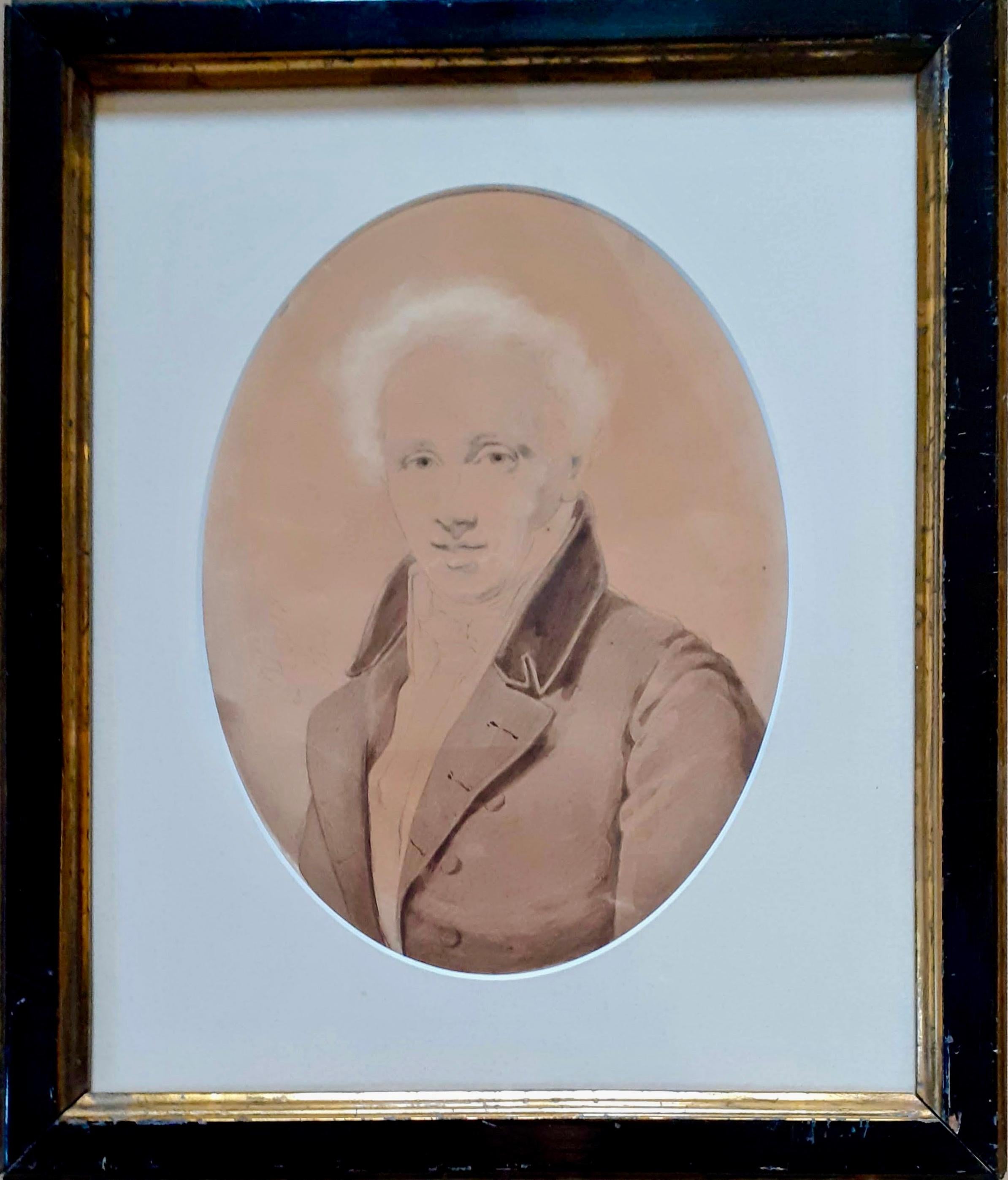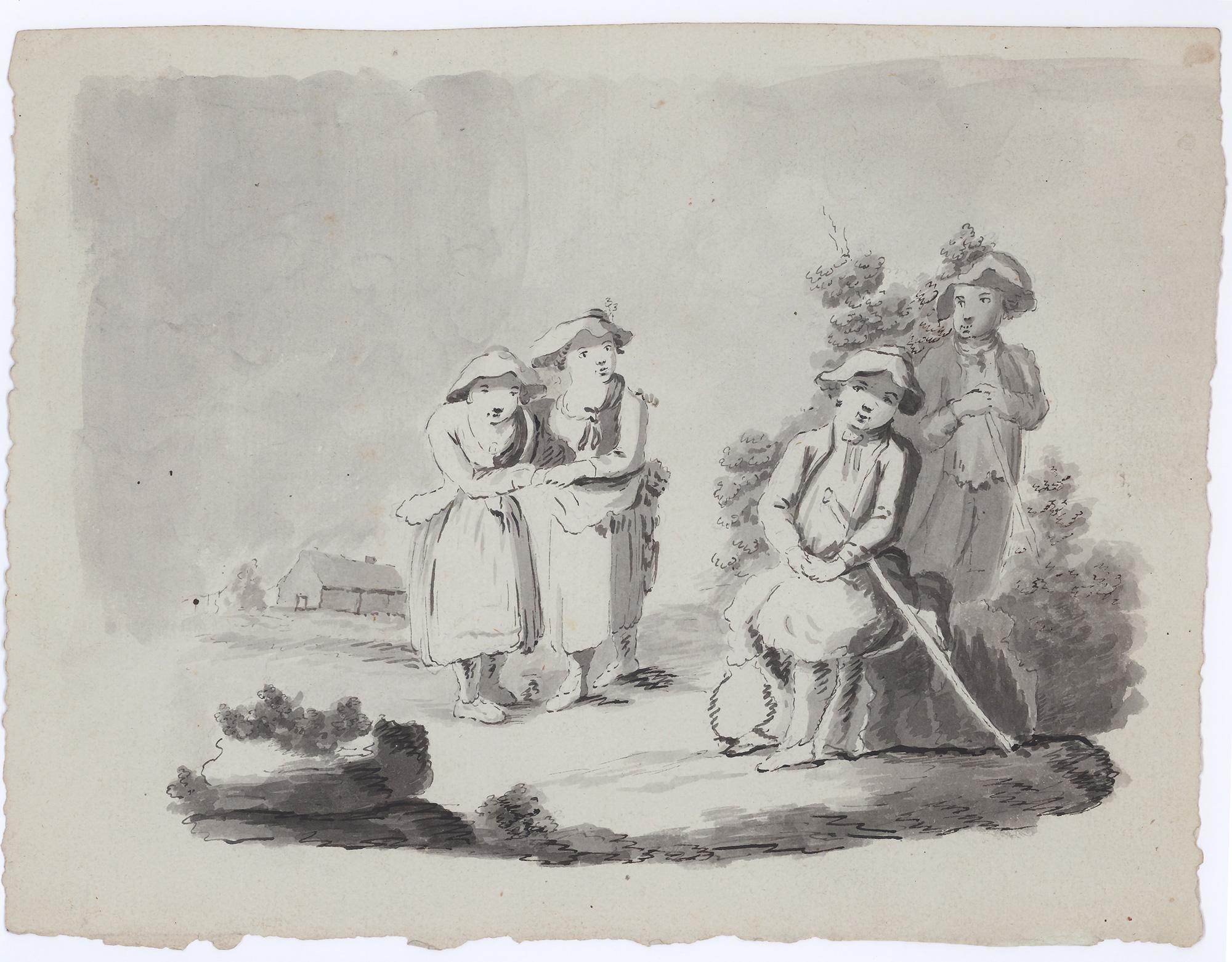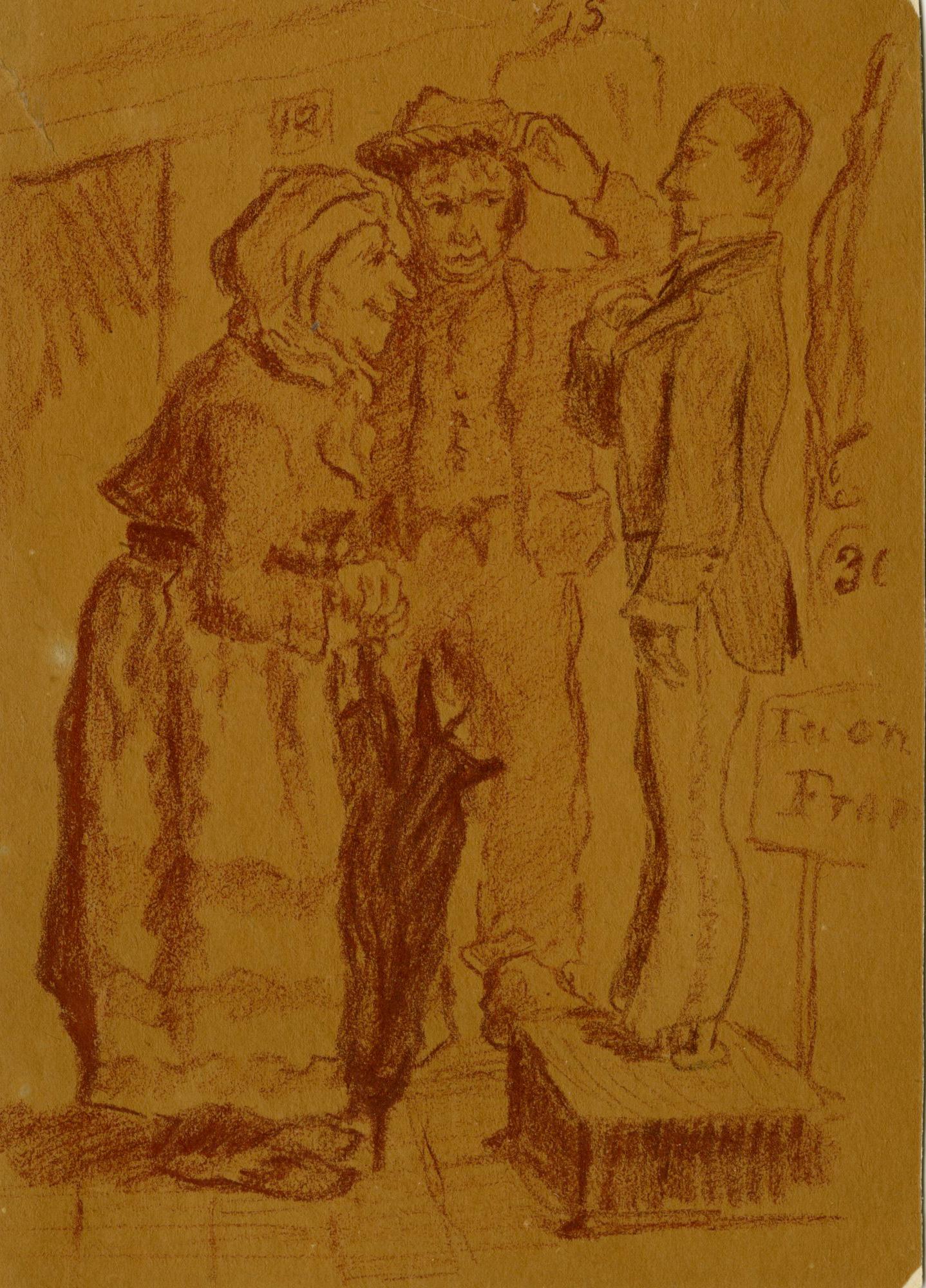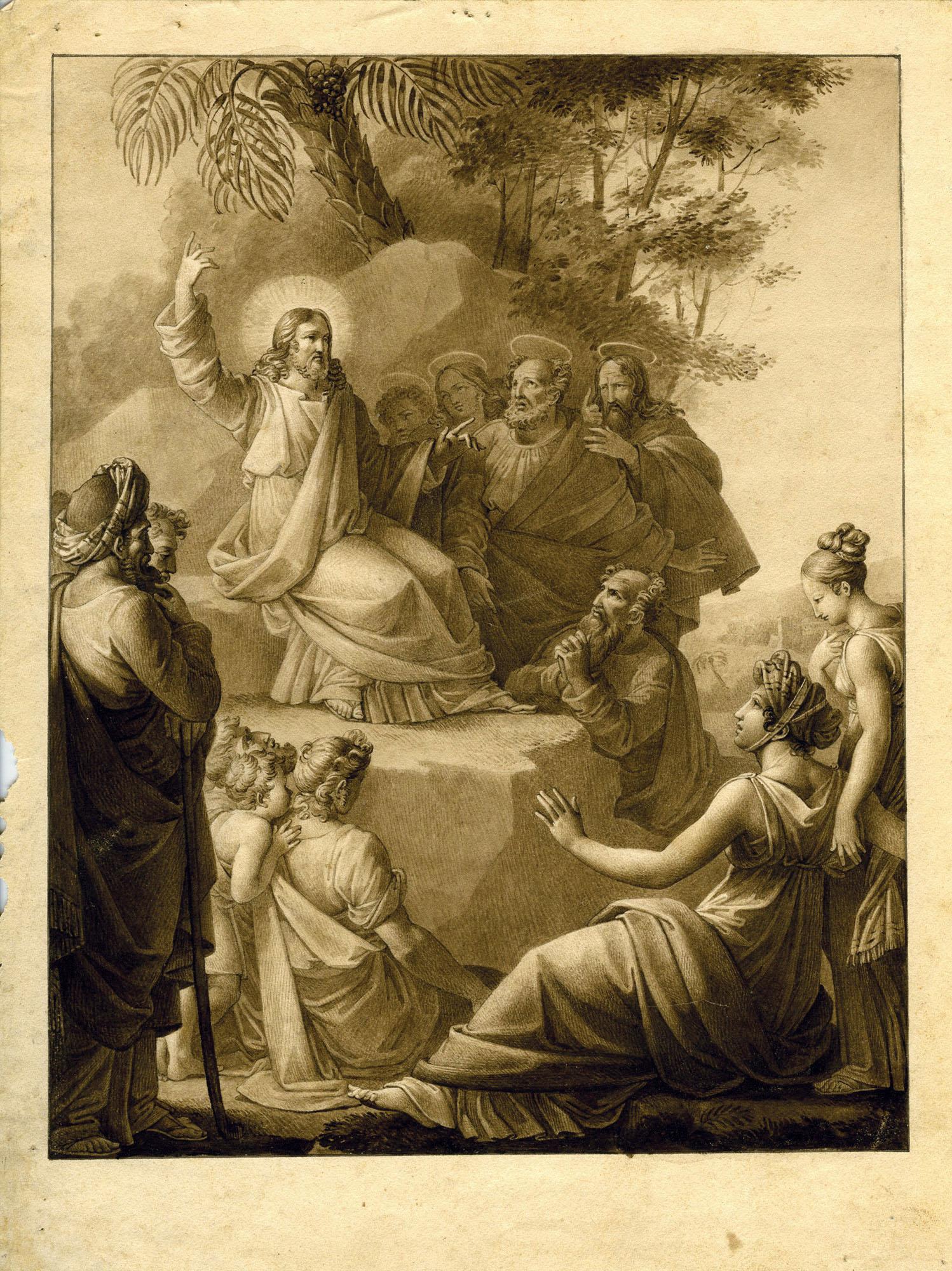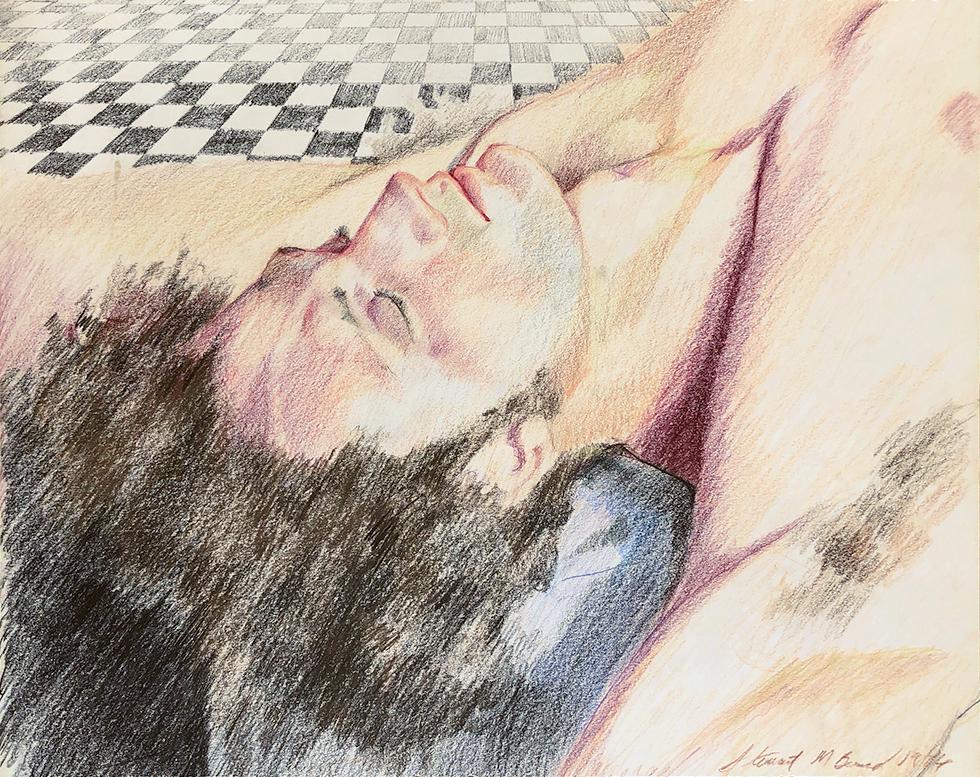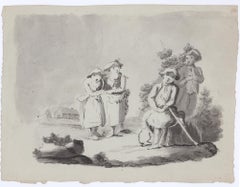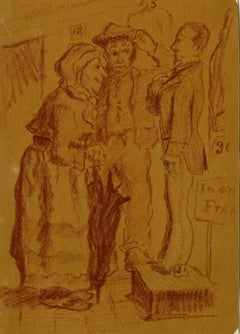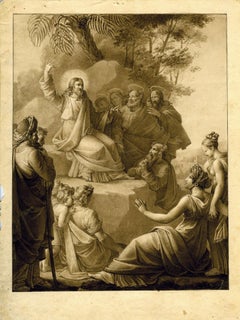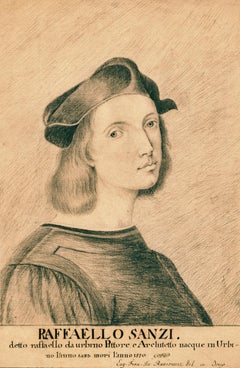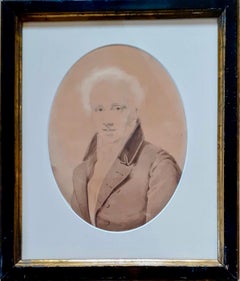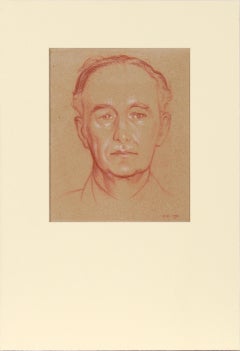Items Similar to Portrait of Fingal / Finn MacCool - A moving portrait of an Irish literary hero
Want more images or videos?
Request additional images or videos from the seller
1 of 6
UnknownPortrait of Fingal / Finn MacCool - A moving portrait of an Irish literary hero1833
1833
About the Item
Black chalk and graphite on light weight cream wove paper, 16 1/8 x 11 1/4 inches, (410 x 286 mm), the full sheet. Signed, titled, and dated in sepia ink in the lower-center sheet area. With horizontal folds approximately 1-inch from the sheet edge at each of the four sheets. The drawing appears to have been folded at the sheet edges to fit into a frame.
Finn mac Cumail (or mac Umaill), often anglicized Finn McCool or MacCool, is a hero in Irish mythology, as well as in later Scottish and Manx folklore. He is the leader of the Fianna bands of young roving hunter-warriors, as well as being a seer and poet. He is said to have a magic thumb that bestows him with great wisdom. He is often depicted hunting with his hounds Bran and Sceólang, and fighting with his spear and sword. Fionn MacCumhail was transformed into the character "Fingal" in James Macpherson's poem cycle Ossian (1760), which Macpherson claimed was translated out of discovered Ossianic poetry written in the Scottish Gaelic language.
Fionn MacCumhail features heavily in modern Irish literature. Most notably he makes several appearances in James Joyce's Finnegans Wake (1939) and some have posited that the title, taken from the street ballad "Finnegan's Wake," may also be a blend of "Finn again is awake," referring to his eventual awakening to defend Ireland.
- Creation Year:1833
- Dimensions:Height: 16.15 in (41 cm)Width: 11.26 in (28.6 cm)
- Medium:
- Movement & Style:
- Period:
- Condition:
- Gallery Location:Middletown, NY
- Reference Number:Seller: BH10261stDibs: LU1979215728622
About the Seller
5.0
Vetted Professional Seller
Every seller passes strict standards for authenticity and reliability
Established in 2004
1stDibs seller since 2022
65 sales on 1stDibs
Typical response time: 6 hours
- ShippingRetrieving quote...Shipping from: Middletown, NY
- Return Policy
Authenticity Guarantee
In the unlikely event there’s an issue with an item’s authenticity, contact us within 1 year for a full refund. DetailsMoney-Back Guarantee
If your item is not as described, is damaged in transit, or does not arrive, contact us within 7 days for a full refund. Details24-Hour Cancellation
You have a 24-hour grace period in which to reconsider your purchase, with no questions asked.Vetted Professional Sellers
Our world-class sellers must adhere to strict standards for service and quality, maintaining the integrity of our listings.Price-Match Guarantee
If you find that a seller listed the same item for a lower price elsewhere, we’ll match it.Trusted Global Delivery
Our best-in-class carrier network provides specialized shipping options worldwide, including custom delivery.More From This Seller
View AllThe Introduction, French School, 18th century
Located in Middletown, NY
In this charming scene a maid appears bashful as she is introduced by her mother to the shepherd’s son.
Ink and wash on hand made, cool-toned cream laid paper, 6 3/4 x 8 7/8 inches...
Category
Mid-18th Century French School Figurative Drawings and Watercolors
Materials
Ink, Watercolor, Handmade Paper, Laid Paper
Rural couple examining a traveling carnival display – French School, 19th cent.
Located in Middletown, NY
Red crayon on brown light-wove paper, 6 3/4 x 4 3/4 inches (172 x 121 mm). Light toning and extremely minor, small losses at the very extreme top right and left corners (1/8-inch).
Category
Mid-19th Century French School Figurative Drawings and Watercolors
Materials
Handmade Paper, Crayon
The Sermon on the Mount – French School, 19th century
Located in Middletown, NY
Pen and ink with wash on watermarked J Whatman 1814 paper, 11 x 8 1/4 (280 x 210 mm). Scattered minor edge losses at the left sheet edge, well outside of image area. Minor handling w...
Category
19th Century French School Figurative Drawings and Watercolors
Materials
Ink, Handmade Paper
Portrait of Raffaello / Italian School
Located in Middletown, NY
Graphite and ink on handmade, watermarked C & I Honig laid paper, 8 15/16 x 6 3/4 inches (226 x 170 mm). Signed illegibly in ink, lower margin. Scattered light creasing and surface...
Category
18th Century Italian School Portrait Drawings and Watercolors
Materials
Ink, Handmade Paper, Graphite
Study for Assumption of the Virgin
Located in Middletown, NY
Graphite on hand made, fibrous wove paper, finished with gray wash. Unevenly trimmed sheet edges, non-archival tape remnants at all four corners, recto, well outside of image area. Horseshoe-shaped area of light discoloration that extends significantly into the figure's face, beneath the lips, and up over the rear of the head, dog-eared right lower corner with associated light discoloration at crease. DeMin and Belluno inscribed in graphite, verso.
A detailed study showing 'primo pensiero' for Giovanni DeMin's large scale fresco, Assumption of the Virgin...
Category
Mid-19th Century Old Masters Portrait Drawings and Watercolors
Materials
Handmade Paper, Graphite
Study of a Sleeping Girl in a Cap
By Jean-Baptiste Greuze
Located in Middletown, NY
Graphite on greenish gray wove paper. 15 1/4 x 11 5/8 inches (390 x 295 mm). Initialed "G. B." in pencil on the lower right recto. In generally good condition with some minor scattered surface soiling. Condition is consistent with age.
____
This drawing is closely related to two known mid 18th century oils...
Category
18th Century Old Masters Portrait Drawings and Watercolors
Materials
Handmade Paper, Graphite
You May Also Like
Portrait of a Gentleman in a Redingote by student od Jean Louis David drawing
Located in Norwich, GB
An exceptional ink, wash and graphite portrait of a gentleman by Henri-Joseph Hesse, dating from circa 1820, the time of the Bourbon restoration in France. It depicts a dashing figur...
Category
Early 19th Century French School Portrait Drawings and Watercolors
Materials
Paper, Ink, Graphite
Untitled (Man Reclining on Tile Floor)
By Mark Beard
Located in New York, NY
Graphite and conté crayon on paper
Signed and dated, l.r.
This artwork is offered by ClampArt, located in New York City.
Mark Beard, born in 1956 in Salt Lake City, now lives in Ne...
Category
1970s Realist Figurative Drawings and Watercolors
Materials
Paper, Graphite, Conté
Study of a saint, circa 1875-79, Preparatory drawing
Located in PARIS, FR
Melchior DOZE (1827-1913)
Study of a saint, ca. 1875-79
Preparatory drawing for the decoration of the church of Saint-Félix de Saint-Gervasy (Gard), chapel of the Cross (south side),...
Category
1870s Academic Figurative Drawings and Watercolors
Materials
Paper, Chalk, Graphite
Portrait of Leopold Myers by Sir William Rothenstein
By Sir William Rothenstein
Located in Soquel, CA
Stately sanguine portrait of Leopold Hamilton Myers (Novelist) by Sir William Rothenstein (English, 1872-1945). Captured in Rothenstein's characteristic style, Myers looks directly at the viewer with a neutral expression. Although this portrait uses only two colors and minimal shading, the likeness of Myers is incredibly well captured. Leo (Leopold) Hamilton Myers (1881 – 1944) was a British novelist. Numerous examples like this one of the writer are in the Tate Museum.
Initialed and dated in the lower right corner ("W.R. 1936")
Inscription on verso indicating materials, subject, and artist.
Presented in a new cream colored mat with foamcore backing.
Mat size: 18"H x 12"W
Paper size: 15.25"H x 10.75"W
William Rothenstein (English, 1872-1945) was born into a German-Jewish family in Bradford, West Yorkshire. His father, Moritz, emigrated from Germany in 1859 to work in Bradford's burgeoning textile industry. Soon afterwards he married Bertha Dux, and they had six children, of which William was the fifth. Rothenstein was knighted in 1931.
Rothenstein left Bradford Grammar School at the age of sixteen to study at the Slade School of Art*, London (1888-1893), where he was taught by Alphonse Legros, and the Académie Julian* in Paris (1889-1893), where he met and was encouraged by James McNeill Whistler, Edgar Degas and Henri Toulouse-Lautrec. Whilst in Paris he also befriended the Anglo-Australian artist Charles Conder, with whom he shared a studio in Montmartre. In 1893 he returned to England to work on "Oxford Characters" a series of lithographic* portraits.
In Oxford he met and became a close friend of the caricaturist* and parodist Max Beerbohm, who later immortalised him in the short story Enoch Soames (1919). During the 1890s Rothenstein exhibited with the New English Art Club* and, in 1900, won a silver medal for his painting The Doll's House at the Exposition Universelle. In 1898 he co-founded the Carfax Gallery in St. James' Piccadilly with John Fothergill. During its early years the gallery was closely associated with such artists as Charles Conder, Philip Wilson Steer, Charles Ricketts and Augustus John. It also exhibited the work of Auguste Rodin, whose growing reputation in England owed much to Rothenstein's friendship and missionary zeal. The gallery was later the home for all three exhibitions of The Camden Town Group*, led by Rothenstein's friend and close contemporary Walter Sickert.
Rothenstein is best known for his portrait drawings of famous individuals and for being an official war artist in both World War I and World War II. He was also a member of the International Society of Sculptors, Painters & Gravers. The style and subject of his paintings varies, though certain themes reappear, in particular an interest in 'weighty' or 'essential' subjects tackled in a restrained manner. Good examples include Parting at Morning (1891), Mother and Child (1903) and Jews Mourning at a Synagogue (1907) - all of which are owned by the Tate Gallery. The National Portrait Gallery owns over two hundred of his portraits. In 2011 the BBC and the Public Catalogue Foundation began cataloguing all of his paintings in public ownership online.
Between 1902 and 1912 Rothenstein lived in Hampstead, London, where his social circle included such names as H.G.Wells, Joseph Conrad and the artist Augustus John. Amongst the young artists to visit Rothenstein in Hampstead were Mark Gertler...
Category
1930s Realist Portrait Drawings and Watercolors
Materials
Conté, Handmade Paper
$2,600 Sale Price
20% Off
The Hypochondriac: French 19th Century Theatre Comedy drawing
By Paul Gavarni (Guillaume Sulpice Chevalier)
Located in Norwich, GB
A magnificent and sensitively treated line drawing in coloured ink, heightened with white. It depicts Argan, the hypochondriac from Molière's play of the same name. Dating from circa...
Category
Mid-19th Century French School Figurative Drawings and Watercolors
Materials
Paper, Ink, Gouache
Woman in thought and Child: the page boy intriguing 19th Century Master drawing
By Gustave Jean Jacquet
Located in Norwich, GB
A virtuoso charcoal sketch by the Frech 19th Century master Gustave Jean Jacquet (1846-1904). It depicts a thoughtful woman (or woman in thought?) with her face resting on her hand...
Category
Late 19th Century French School Figurative Drawings and Watercolors
Materials
Charcoal, Laid Paper
